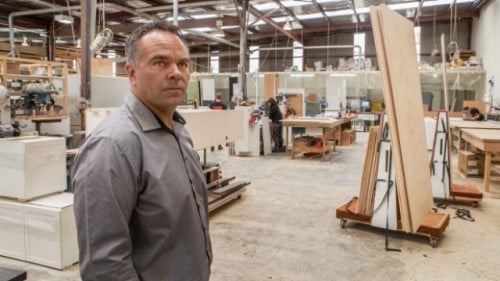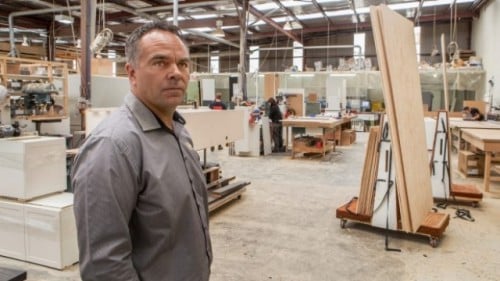
Gary Altenburg’s joinery business reborn after quakes and The Icehouse attitude change.
The owner of a Christchurch joinery firm almost gave up his business after the Canterbury earthquakes but is thriving with the help of a business mentoring scheme.

In the process, Gary Altenburg has rediscovered the meaning of work-life balance.
As a child, he used to work before school, come home at lunchtime to work in his parents’ business and then head back there for more toil.
His father Dave was from Friesland in the Netherlands. One of 15 children, he was 21 when he jumped on a ship to New Zealand and married Anne, a North Islander who gave the Altenburgs their Maori heritage.
The family made a living from the hydro-electric power scheme in Roxburgh, Central Otago. Dad initially worked for Hydro Haulage and later the family, including their eight kids, ran a local diner and fish and chip shop.
Gary said he had no regrets about spending so much of his young life on a shop floor, even if nowadays he made a point of not working so hard.
He said the Canterbury earthquakes nearly wiped out his company, MWF Manufacturing, but encouragement from staff and The Icehouse mentors gave him the confidence and the skills to make the business leaner and eventually bigger.
The company specialises in custom designs for a range of products, like bespoke kitchens. It also does fit-outs, like its work on the Vodafone office complex being built in central Christchurch. The job was about design as well as build, Altenburg said.
It usually worked for construction firms, aiming for as much repeat business as possible. One client had asked it to do about nine of those high-end kitchens.
It sounds like solid income, but MWF’s journey has been fraught.
MWF was founded in 2001 and Altenburg gradually increased his share of the company over the following decade to eventually own it outright.
In 2010, the Canterbury earthquakes wrecked his dream home at Brooklands, on Christchurch’s north-eastern outskirts.
Five years on, Altenburg is still negotiating a payout on MWF’sold Leeds St joinery factory site in the central city.
In rebuilding the business, Altenburg has moved the business to suburban Bromley and now a bigger site at Belfast.
In that time he had also embraced business mentoring programme The Icehouse. He joined in 2010, just after one of his friends had been through the course.
“I was sitting down with her and realised, for the first time in a long time, she wasn’t running around like a headless chicken.
“It was bizarre; she had this real sense of calm about her. She then started harping on about [The Icehouse] and how much it had helped her.”
One thing he realised, after doing the Icehouse Owner Manager Programme, was that he probably damaged his marriage because he spent too much time either at work or thinking about it.
Now he went out of his way to find time for friends, family and exercise. He said he had never felt fitter or more relaxed: his youth was gone but he was doing as much as he could to get some of that energy back.
Ironically, his revitalised attitude started with the rebuild of his business.
He said one of the turning points of his life was soon after the quakes, when he stood outside his old garage at Brooklands and asked his staff whether they thought it was worth trying to restart the company.
At that point, MWF was basically spent. “It was like our bank accounts were frozen,” he said.
His employees, several of whom had young family, implored him to carry on. Altenburg agreed they had an opportunity to make the company better.
Altenburg took advice from The Icehouse, which has a programme called Lean and 54 steps for participants to follow. It took MWF until late 2013 to get in some sort of order, but now it was a completely new business, Altenburg said.
About 2013, he met mentors from firms like Fonterra, farm products manufacturer Tru-Test and breakfast cereal-maker Hubbards. He learnt about eliminating wasted energy at work, efficient processes and working for customers.
The company had not yet completed a quarter of the 54 Lean steps but it had made big progress, Altenburg said.
The Belfast joinery plant would soon be several times bigger than the 650 square metres it was at the start.
Since 2010, turnover had risen from $2.8 million to about $7m.
If anything, the recent challenge had been containing the expansion. In 2015, the business grew 35 per cent and it nearly blew the company apart, Altenburg said. He recently trimmed staff from 40 to 35 to ensure the company’s growth was sustainable.
“I’m not sure I would go through [the business recovery] again. It’s been a long, hard road where many times I’ve thought about chucking in the towel.
“However, we wouldn’t have got to where we are today without The Icehouse and their network,” he said.



